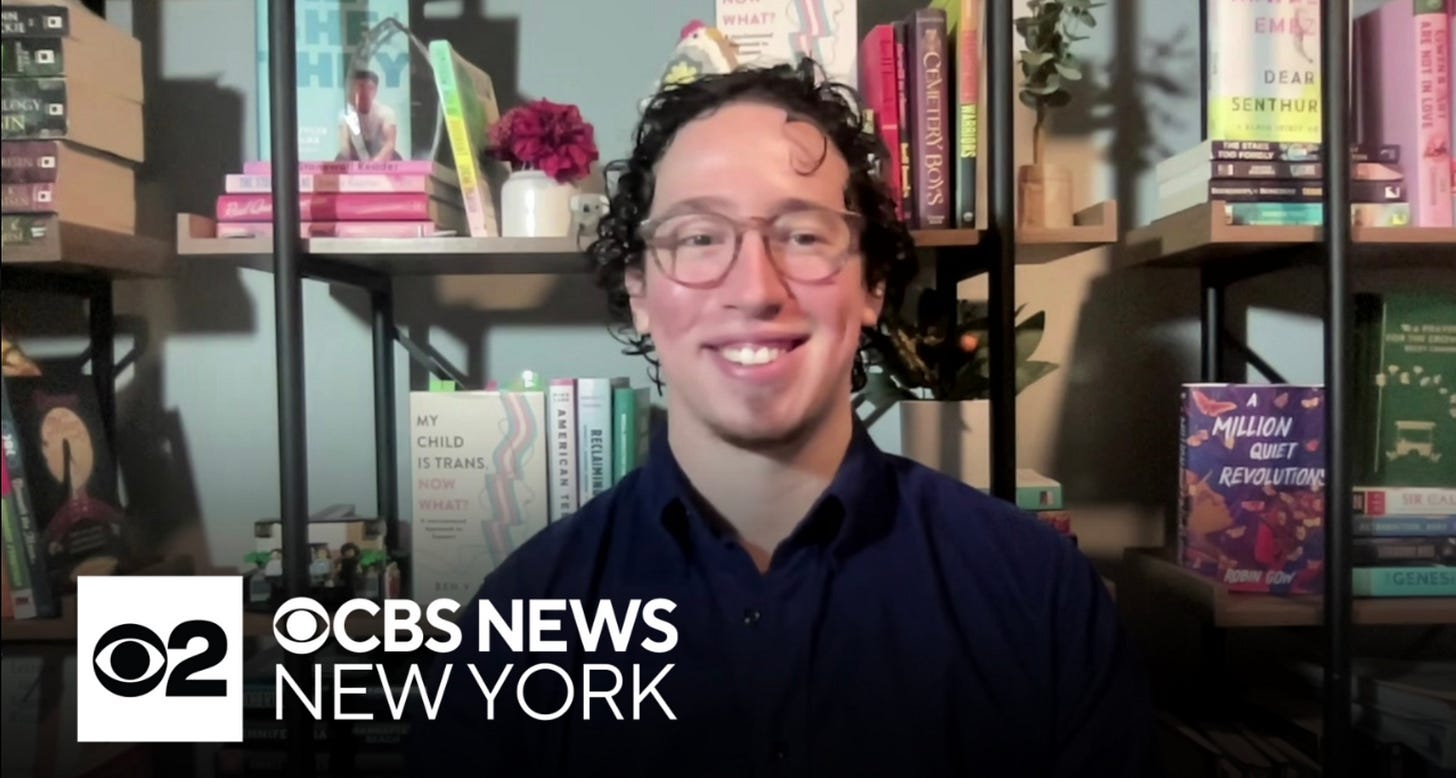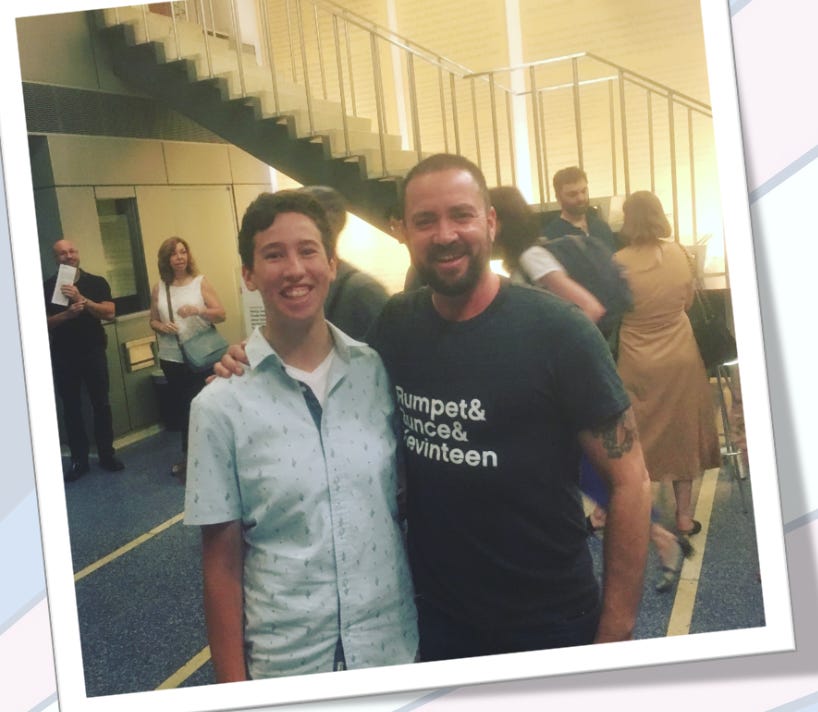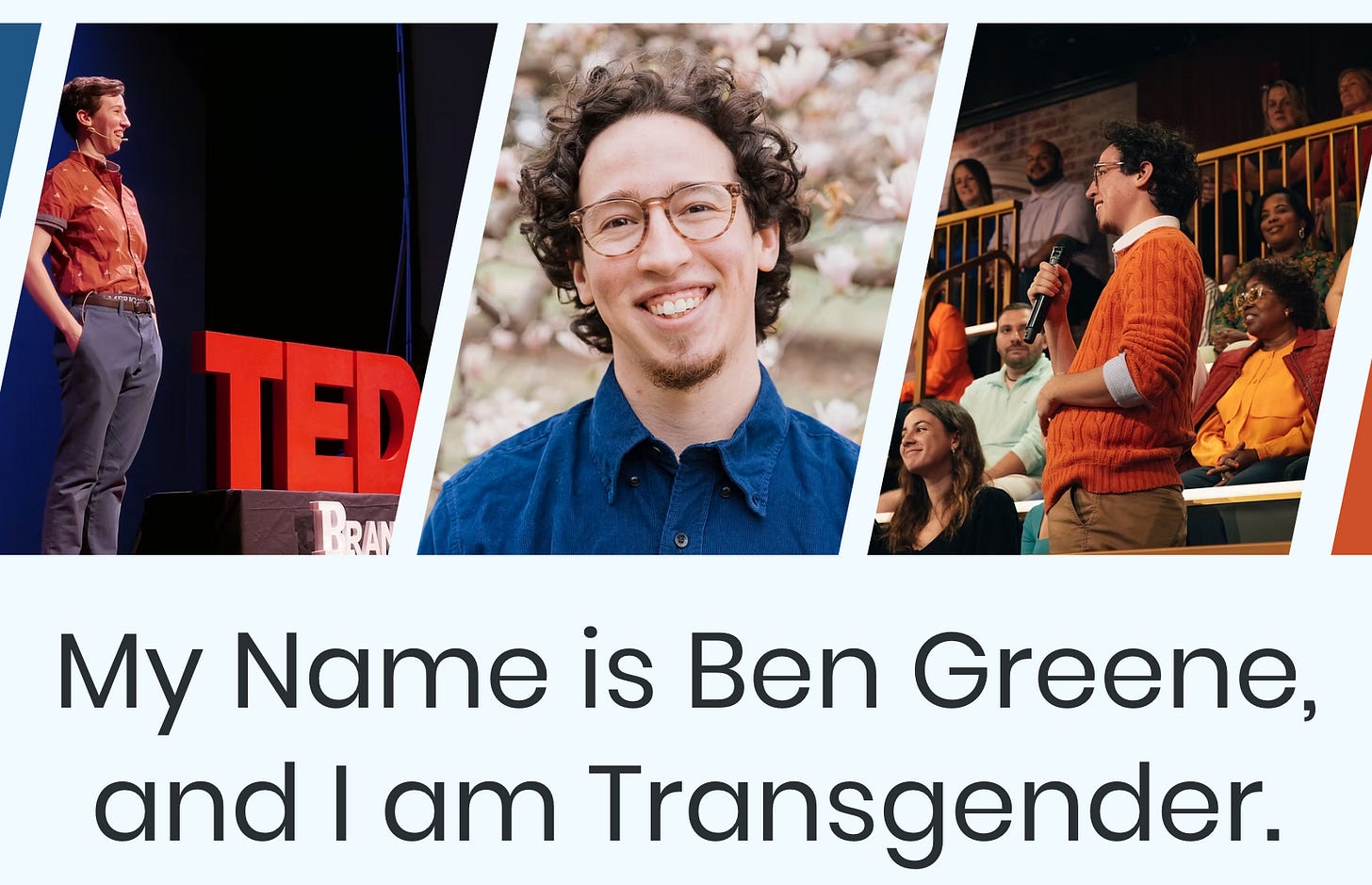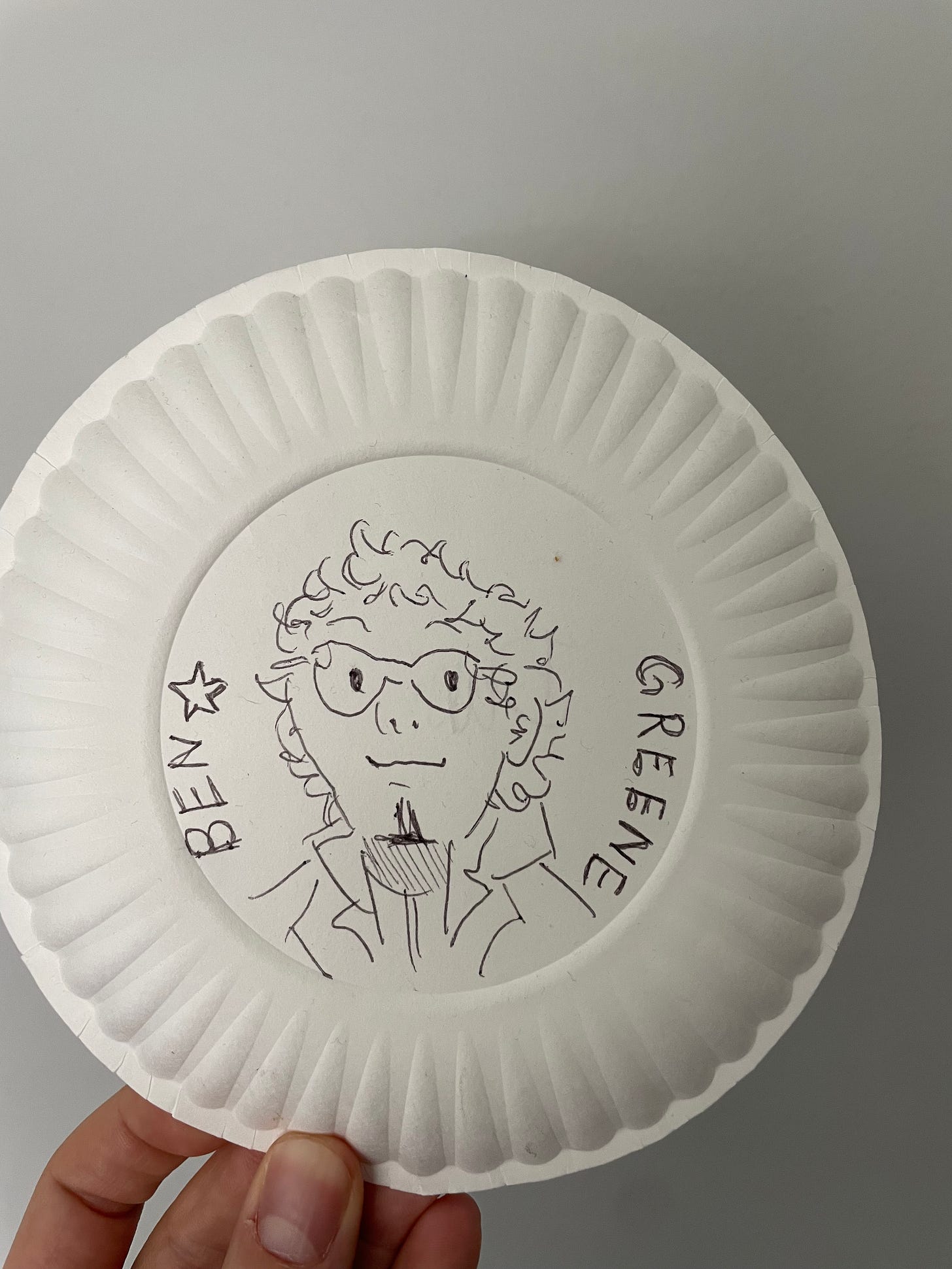Visibility? In this Economy?
What we stand to gain, what we stand to give, and what we stand to lose
TDOV was HIGHLY visible and action packed for me yesterday (ergo getting a TDOV newsletter not on TDOV). The coolest part though was being on CBS New York yesterday morning! Here’s the clip if you’d like to watch me talk about what TDOV means to me :)
Also, since this is my last newsletter before Wednesday night (probably), one last plug for my free webinar called “Future Dreaming and Your Advocacy Superpower” about the role of joy in the fight for a better world. If you’ve been feeling hopeless or paralyzed, this will hopefully be an antidote to that. Even if you aren’t free, if you RSVP you’ll get a copy of the recording!
Okay, now that housekeeping is out of the way, I want to share a few of my reflections on yesterday’s international transgender day of visibility.
My Young Experiences of Visibility
For most of my transition, I have been highly visible. I have understood that my existence means something to people in a way that I’ll never fully understand.
As a co-president of an underground LGBTQ support network for highschoolers across the state of Connecticut, I regularly had people seek me out to coach them on coming out to their parents, or to help them figure out if they were trans, queer, etc.
I called them my kids, and at any given moment I had between two and five, who I was texting or calling near constantly, answering their questions and sometimes talking them off ledges. To any of my kids who are reading this, know that I remember all of you, and I try my best to keep tabs on you all like a proud papa bear.
I was also highly visible to the adult in my life, helping to craft school policy, train guidance, staff, and teach our health classes. As I’ve spoken about many times before, this period of my life was both incredibly draining and incredibly empowering. It also created my relationship to visibility as a one-directional concept: this was simply something I owed to others.
Besides the very short list of trans tragedies I could see on TV, I couldn't see a future for myself. I was out there keeping as many kids as I could alive while knowing that my clock was quickly running out because I had never seen an alternative.
Meeting a Trans Adult!
After my freshman year of college, I went to see an off-Broadway play that featured a transgender man playing a trans character who had a happy ending, and my mind was blown. After the show, I wanted to walk right up to him and say, “I’ve never seen myself represented on a stage before. It gives me so much hope for myself, and for my future as a transgender man. Thank you.” When he came out from backstage after the show, I was all ready to give him my spiel. I took one look at him, opened my mouth, and just started sobbing. I couldn’t get a word out, but he saw me and came right up to me and started crying too. He pulled me in, and we just stood there crying in each other’s arms, not saying a word but understanding everything we needed to know about each other. After a few minutes, he stepped back and said, “This is it. This is why representation matters.” And he told me the story of how the exact same thing happened to him the first time he saw a transgender person on stage, twenty years before, and the difference that made for him.
This was an incredibly pivotal moment for me, both in realizing that I would get to grow up, and in realizing how big the impact of visibility to could be. I had spent years going back and forth about how visible I wanted to be, how much exhaustion I was willing to put up with. But this moment pushed me to decide that I wanted to be that figure—that "aha" moment of realizing that we get to grow up and find love and find joy—for as many people as I possibly could.
After giving my TEDx talk, this feeling of becoming something bigger than myself amplified significantly. People started to reach out to me telling me they were using my talk to explain allyship to their teachers, or to come out to their parents. One person reached out to me to tell me that it had saved their life.
It was thrilling to understand that I represented something so much bigger than myself to so many. I decided to graduate college early to pursue public speaking and advocacy and cement my visibility as a career. I found early success, but the pressure also became heavier and heavier.
Stepping into my Full Visibility
The homepage of my speaking website says "My name is Ben Greene, and I am transgender." Once I hit publish on that page, I knew there was no going back. I closed the visibility door behind me and marched forward, frightened but prepared.
When one of my tiktok affirmations went viral, my "trans older brother" style of content quickly garnered about 30 thousand followers, many of whom were young, isolated LGBTQ+ people who let me know often how much my videos meant to them.
They often messaged me to tell me I was the oldest trans person they'd ever met, that their families weren't supportive but I was a perfect stand in. To be clear, it's not that these comments are unwanted or inappropriate. They are beautiful, raw, and meaningful. But in such a high volume, it was a lot to take in.
I had never been more visible, nor had I ever been more stressed. As I became more visible on social media, I also became a more visible target for hate in my comments and in my direct messages. As a white transmasculine person, the hate I got was also far smaller than what my transfeminine and QTPOC friends face online, but it was still deeply unpleasant (to say the least).
Since concentrating my social-media energy on Substack, I've found a decrease in vitriol (by a lot). But as I approach the threshold of 8,000 subscribers, the familiar pressure of understanding what I mean to the people around me sits across my shoulders.
I've become more intentional about my social media habits and where I put my energy, but I haven't scaled back my visibility. At all. I have definitely scaled it up.
A lot of people I know have done the opposite. Who have chosen to keep their cards close to the vest, or go back into the closet when they move to a new city. Things feel hostile and frightening, and many trans folks are reckoning with an important truth: visbility is not something the trans community owes to others. There is no lying or deception, just a piece of our story we are choosing not to share right now. I don't fault anyone for feeling that way.
My own relationship to visibility, as you can likely guess by now, is and always will be incredibly complicated. Visibility is a complicated thing. Sometimes.
Other times, it's a simple, beautiful gift I give to another human. After speaking at a gala in Sauk Valley, Illinois, a young trans person presented me with this drawing they'd done of me because of how excited they were to be meeting a trans adult.
I want to be as visible as I can for all those young people to have an example of a positive possibility model. This cat is out of the bag, so I'm going to use my visibility to make as big an impact as possible so others don't have to.
As Billie Jean King said, pressure is a privilege. It is a gift to be trusted with the hopes of so many people. Not everyone wants to fill the role that I do, but I'm so honored to fill it. That doesn't mean I'm going to let it burn me out, though. Intentionality is the theme I come back to regularly, and I have a very intentional relationship with visibility. I'm always checking in to see:
how am I getting visibility?
how am I ensuring visibility isn't costing me my safety?
How am I developing an identity outside of the highly visible parts of my life?
I'm really mindful of wanting to engage with community and media that gives me continuous possibility models. Trans folks with kids. Trans folks growing as humans. Trans folks going on outer space adventures and falling in love. Basic stuff. Being visible doesn't cost quite as much for me when I know that I'm not the only trans person--even if the people I'm talking to don't know that yet.
I'm also not reckless with my visibility. I love posting on social media, but I never post my address or identifying locations in my home, and I use a few privacy softwares to make sure that my data isn't easy to find online. Sometimes, I choose not to share that I am transgender to give myself a gift of safety and ease, and I don't need to feel guilty about taking those moments. I have to trust my gut and keep myself safe.
For a while, my whole concept of myself was built around what I knew I meant to other people. My work was saving lives. I was saving lives, so how could I ever take a break without choosing to sacrifice someone? Slowly, with much encouragement from friends and my therapist, I started to lean into my hobbies, my interests, and the little pieces of myself I love most. I think I'm funny and good at cooking and a nice person to talk to about books. I like being a nice friend. I do not allow my work, my accomplishments, or what I mean to people to dictate how I feel about myself, because that is a one-way ticket to burnout town for me.
How do you feel about visibility? Is it as complicated as my own feelings, or do you feel strongly one way or the other?
Either way, I hope you know that however visible you may or may not feel, you are not being graded on your transness. You’re trans? A plus. I see you, I love you, and I am here fighting for you.
That's all for now!
With love as always,
Ben







i love this so, so much. in a similar vein, i have this print hanging up in my therapy office: https://www.etsy.com/listing/1336324102/4-x-6-print-people-like-us (also made by a transmasc person). i'm in my 40s and i work with a lot of queer/trans 20 somethings and one thing I hear a lot is that i give them hope, simply by still being myself at my age. which is hilarious, because my life is totally fucked up, but I get what they mean, and on my darkest days it gives me the inspiration to keep going.
Thanks for sharing. I have a lot of similar reasons for making similar choices about visibility. It has nothing to do with wanting the attention and everything to do with how much it meant to me every time I encountered representation of parts of myself I’d never seen reflected or celebrated before. Especially as a trans person in a happy and healthy 20+ year marriage that has stayed strong through my entire transition, I have come to be very aware of the impact of younger queer & trans people seeing us together & happy, after so long and so many changes.